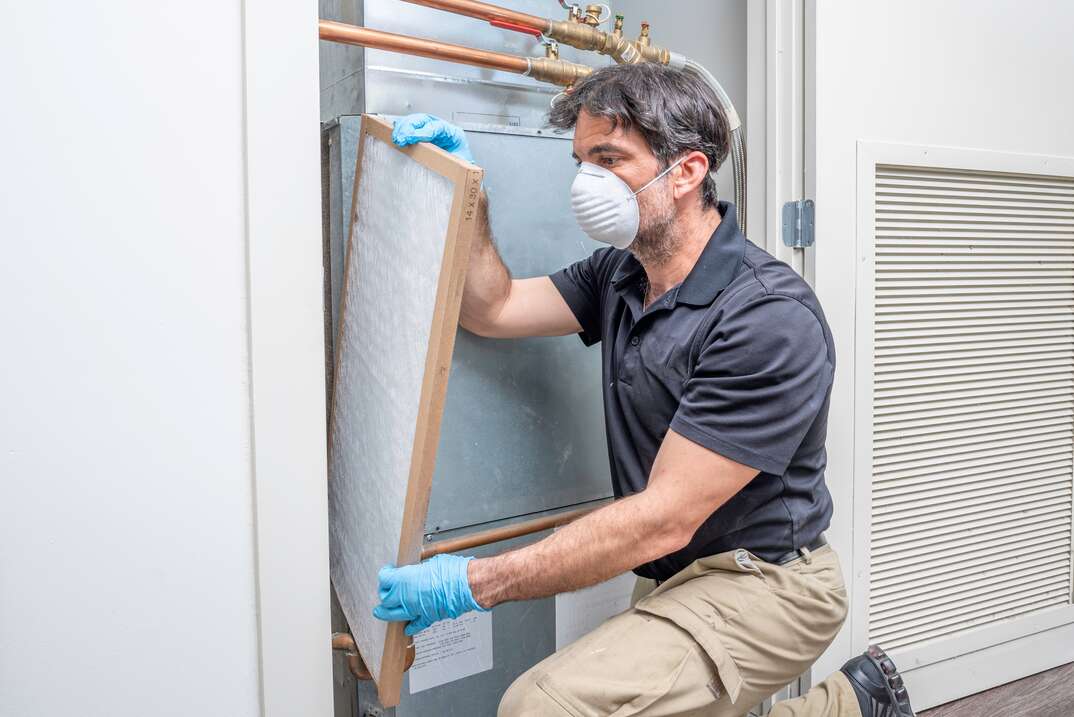6 Ways to Save Money on HVAC Repairs

Finding out you have HVAC issues often comes at the worst time. Coming home to a freezing cold house in the winter or waking up sweating on a summer night quickly makes you realize your HVAC system needs repairs.
Read More Heating and Cooling Articles
Professional HVAC repairs can be costly, especially for major issues. One of the best ways to save money on HVAC repairs is by avoiding them in the first place. Handling routine maintenance and taking care of your system can help with that.
How to Save Money on HVAC Repairs
Schedule Routine Maintenance
You should have your HVAC system professionally serviced at least once per year. Even better, have an HVAC technician come out twice per year: before the heating season and before the cooling season. The technician will look inside your unit to check all the parts. They typically clean and lubricate the moving parts to keep things moving smoothly. If they notice any damage or issues, they'll repair them to keep the damage from getting worse and the repairs more expensive.
Routine maintenance can prevent wear and tear on some parts, which can reduce the need for costly HVAC repairs. If there's an issue, it's usually easier to fix when it's minor. Regular HVAC service appointments can also help your system run more efficiently, which can reduce your utility bills.
2. Maintain the Filters
A simple maintenance task you can do regularly is changing or cleaning your HVAC filters. The frequency can depend on the type of filter and the environment, but you should generally change or clean your filter at least once every three months. If you have pets or live in a dusty area, the filter could get dirty faster and need to be changed sooner. Look at the filter once a month to see if it's time to maintain it. Some newer systems with smart thermostats give you a notification when your filter needs to be changed.
3. Watch for Signs of Issues
When your HVAC system is working correctly, you might not even notice it running. However, it often gives subtle signs when something is starting to go wrong. You might notice an increase in your energy bills to indicate that the unit is working harder to keep your home comfortable. Strange noises or smells coming from the HVAC unit can be an indicator of a problem. You might also notice that the system is struggling to keep up or that the temperature is inconsistent throughout your home.
When something seems off with your system, contact an HVAC professional to investigate. It could be a simple and inexpensive fix that saves you from more extensive problems down the road.
4. Handle Minor Issues on Your Own
Many HVAC repairs are best left to professionals. Working with the internal components could be dangerous, and you might cause more damage if you don't know what you're doing. It's also dangerous to work around the gas or electricity that powers your HVAC unit.
However, you might be able to deal with some minor issues if you feel comfortable with them. For example, sometimes the coils can freeze when you're running your AC. This can happen due to dirty coils or poor airflow due to filter issues. You can shut off the unit and let it thaw to correct the issue. Changing the filter can prevent the problem from happening again.
Another common issue is a clogged drain line. You might be able to clear the clog with a shop vacuum or by pulling visible debris from the line. If you're not comfortable handling a repair, contact an HVAC professional to do the work safely.
More Related Articles:
- Hiring an HVAC Tech? Here are 5 Top Tips
- What's in My HVAC Technician's Van?
- HVAC Out? 5 Common Causes and Quick Fixes for Each
- How Much Does an HVAC Filter Cost?
- HVAC Upkeep Costs: Everything You Need to Know
5. Have Minor Repairs Fixed Quickly
If you know your HVAC unit needs to be repaired, don't hold off. HVAC problems don't typically resolve on their own, but they do often get worse over time. One misaligned part could start to wear on another part, which could also go bad. Now you have multiple components that need to be replaced. If your HVAC system is still functioning safely, you don't need emergency HVAC repair, but you should schedule a technician to fix the issue soon.
6. Keep Up Your Warranty
If you have a newer HVAC system, it likely still has a manufacturer’s warranty in place. The warranty can help cover some repair costs, depending on what happens and the specifics of the warranty. However, many manufacturer warranties require you to have routine maintenance performed to keep the warranty in effect. Read the terms of the manufacturer’s warranty to make sure you're meeting your responsibilities. If your HVAC system has an issue, find out if it's covered by the manufacturer’s warranty to save on your repair costs.
Elocal Editorial Content is for educational and entertainment purposes only. Editorial Content should not be used as a substitute for advice from a licensed professional in your state reviewing your issue. Systems, equipment, issues and circumstances vary. Follow the manufacturer's safety precautions. The opinions, beliefs and viewpoints expressed by the eLocal Editorial Team and other third-party content providers do not necessarily reflect the opinions, beliefs and viewpoints of eLocal or its affiliate companies. Use of the Blog is subject to the
Website Terms and Conditions.The eLocal Editorial Team operates independently of eLocal USA's marketing and sales decisions.

